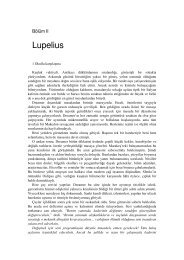Lupelius - The School for Gods
Lupelius - The School for Gods
Lupelius - The School for Gods
- No tags were found...
Create successful ePaper yourself
Turn your PDF publications into a flip-book with our unique Google optimized e-Paper software.
I shook hands with him. I felt the same energy I had seen in his gaze. Father S. wasstudying me. His smile barely concealing the fact that he was gathering and evaluatingin<strong>for</strong>mation so as to classify me. His visitor was not an academic animal but looked more likea young businessman. <strong>The</strong> type of man that Father S. probably did not encounter frequently.“<strong>The</strong> only thing I know about you is that you are interested in moral philosophy and thatyou come from an American university…from New York…if I’m not mistaken,” he said,pronouncing the word ‘only’ with an almost reproachful tone, revealing his nature andprofessorial attitude.“I specialise in Business Ethics” I corrected him courteously, as I handed him a copy of theletter Fordham University had sent a few days earlier. That document confirmed that I was aresearcher, a scholar of business ethics. It was the letter of introduction that I had used to setup this meeting. I felt perfectly at ease in this role. I remained silent. I preferred not to givehim any more in<strong>for</strong>mation about me <strong>for</strong> the moment and leave him on the edge of that feelingof slight unease, caught between curiosity and unfamiliarity. I didn’t want to make his tasktoo easy.As he read, I noticed an expression of growing interest on his face. He gave a visible start ashe read about the studies I was pursuing on <strong>Lupelius</strong> and my hope that our encounter wouldhelp to further my research. With great self‐control he contained his emotions at thisdiscovery and only allowed himself to express mild surprise at my choice of topic – such anextraordinary school of thought, so far from the familiar scientific themes.I did not tell him anything about the Dreamer and I justified my interest in <strong>Lupelius</strong> bytalking about the importance his ideas might have on modern business theory and <strong>for</strong> thetraining of a new generation of leaders. I told him about the high expectations I had of thatbranch of studies, which advocated the application to the world of business of theeducational methods, the value systems and the philosophical principles that belonged to theancient <strong>School</strong>s of being. What I had found of particular interest were the teachings of<strong>Lupelius</strong> and his research into invulnerability and invincibility, because of the relevance thatthese qualities could have today to the challenges of modern economics, no less difficult orfatal than military ones. His research and experiments on immortality conducted in his<strong>School</strong> could be extended to modern enterprises.For a long time, students of economics had been helpless in the face of an alarmingphenomenon of planetary dimensions. “Companies die young. Companies all over the worldhave too short a life cycle, just a handful of years – I told him ‐ Even the giants of finance andthe economy, the largest multinationals on the planet, struggle to survive <strong>for</strong> more than <strong>for</strong>tyyears.” Drawing on the Dreamer’s teachings, I passed off as mine the idea that a durablecompany is born from a durable founder and that an immortal company can only be bornfrom the dream of an immortal being. Once, while talking to me about the polarity oflove/fear, the Dreamer had revealed that the true meaning of love amore could be found in theetymology of the Latin word, ‘a‐mors’, which means the absence of death. Not by chance, thename ‘Roma’, the eternal city, is the anagram of a‐mor. Its destiny to be immortal wascodified in its roots and sealed into the name given to it by its founder. I cited Rome, which12










